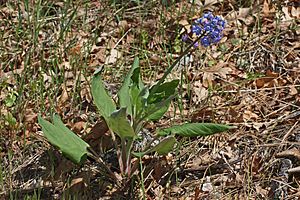Adelinia facts for kids
Quick facts for kids Adelinia |
|
|---|---|
 |
|
| Scientific classification |
|
| Kingdom: | Plantae |
| Clade: | Tracheophytes |
| Clade: | Angiosperms |
| Clade: | Eudicots |
| Clade: | Asterids |
| Order: | Boraginales |
| Family: | Boraginaceae |
| Genus: | Adelinia |
| Species: |
A. grande
|
| Binomial name | |
| Adelinia grande (Dougl. ex Lehm.) J.I.Cohen
|
|
| Script error: The function "autoWithCaption" does not exist. | |
Script error: No such module "Check for conflicting parameters".
Adelinia grande, also called Pacific hound's tongue, is a beautiful flowering plant. It belongs to the borage family. This plant is special because it is the only species in its group, called the genus Adelinia. It used to be known as Cynoglossum grande.
Contents
About Pacific Hound's Tongue
Pacific hound's tongue is a plant that comes back year after year. It grows from a strong taproot deep in the ground. This plant can reach a height of 30 to 90 centimeters (about 1 to 3 feet).
Where It Grows
You can find Pacific hound's tongue in western North America. It grows from British Columbia in Canada all the way down to California in the United States. This plant likes shady spots. It often grows in woodlands and areas with chaparral shrubs. In California oak woodlands, it grows near other plants like Calochortus luteus and Delphinium variegatum.
What It Looks Like
Pacific hound's tongue has distinct features that make it easy to spot.
Stems and Leaves
The plant has an upright stem. Most of its leaves grow near the bottom. Each leaf is oval-shaped and can be up to 15 centimeters (about 6 inches) long. They are attached to the stem by a stalk called a petiole.
Beautiful Blue Flowers
The flowers grow in a cluster called a panicle. Each flower has its own small stalk, known as a pedicel. The flowers are bright to deep blue. They have five lobes, or sections. In the center of each flower, there are small white parts. Each flower is about 1 to 1.5 centimeters (0.4 to 0.6 inches) wide.
Seeds and Fruit
After the flowers bloom, the plant produces its fruit. The fruit is made up of four small, slightly spiky parts. These parts are called nutlets.
Traditional Uses
Long ago, Native Americans used the roots of the Pacific hound's tongue. They would prepare the roots in a special way. This preparation was used to help treat burns and stomach aches.
See also
 In Spanish: Cynoglossum grande para niños
In Spanish: Cynoglossum grande para niños
 | Chris Smalls |
 | Fred Hampton |
 | Ralph Abernathy |

